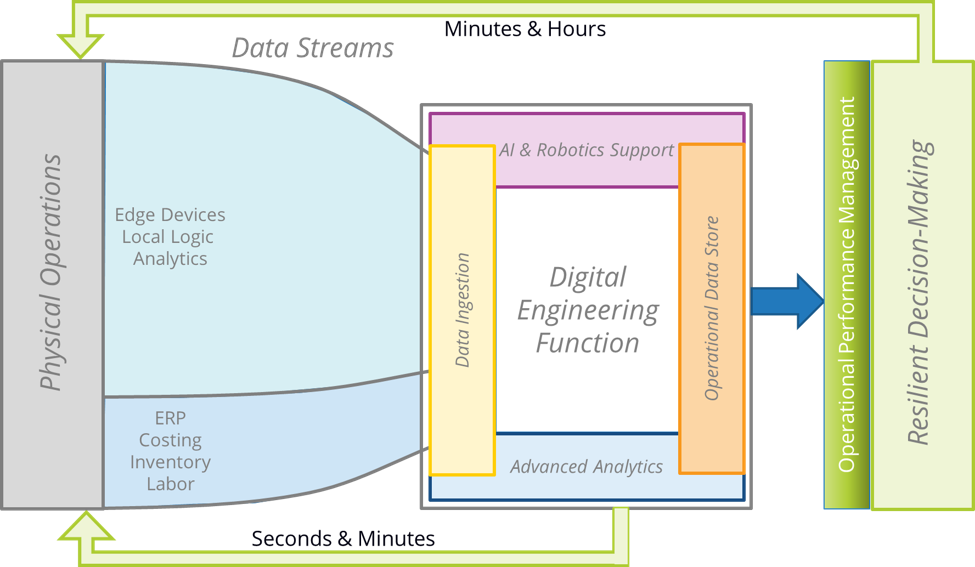The Future of Operations is defined by operations becoming more tightly aligned with the market and customers. A key part of that is a better and more dynamic connection between the transaction-oriented systems and the process-oriented systems in operations. This is known as IT and Operations Technology (OT) convergence.
IT/OT convergence is at the heart of the resilient decision-making that is needed to be a market-driven organization in the Future of Operations. But IT/OT convergence doesn’t happen in a vacuum. Some part of the organization must be responsible for managing how operational data connects to the information technology used by the rest of the enterprise. That part of the enterprise is the Digital Engineering organization.

Digital Engineering: Definition and Responsibilities
Digital Engineering has some basic responsibilities:
- Analytical and AI modeling support, development and lifecycle management, including digital twins
- Data stream and ingestion manager for the Operational Performance Management (OPM) decision and performance support platform
- Arbiter of semantics, tags, and frameworks across all operational systems and into IT
- Digital project manager and ecosystem manager for all the applications in operations
- Continuous improvement and production help desk for operations assets and processes
- Supporting the production Edge architecture connected to the physical assets and processes
In other words, Digital Engineering is becoming the organization that manages the entire technology architecture of operations, while helping IT support and develop the infrastructure in operations. Digital Engineering’s mission statement is:
Using both operational knowledge and technology skills to manage the industrial digital framework for ingesting operational data, providing analytical insights to operations, supporting resilient decision-making, and delivering automation for the market-driven operation
Who Will Work in Digital Engineering?
The most unique aspect of Digital Engineering is the type of people that will operate in the DE function. These are technical staff that have skills, knowledge, and capabilities in both operations and in IT. As the DE organization matures, it might also include equipment Original Equipment Manufacturers (OEMs) and third-party service providers. But companies need to start preparing for how they staff the DE role. Some of the key skills and capabilities are:
- Advanced analytics and comfortable in working with complex datasets
- Capable of understanding basic data management and cloud environments
- Some detailed knowledge of connecting to operational processes and assets through Internet of Things (IoT) technology
- Detailed knowledge of operations cybersecurity and how it works within the enterprise environment
- Has some technical and process domain expertise in specific operational areas
- Functioning and developing in low code environment to develop apps and models for operational needs
These are not roles that every digital engineer will have walking in the door. But these skills must be prioritized for development as the person and organization mature.
Digital Engineering Technology
The Digital Engineering organization will not just be built on people, even though they are the difference-making component. A technology foundation that is made up of numerous systems and platforms that can operate within the broader enterprise IT environment is critical. Examples of these systems are:
- IoT and device management platform supporting new and legacy connections
- AI and analytics workbench to support AI, analytics, and model lifecycle management
- Low code app development environment that forms a managed framework for operational apps
- Operational cybersecurity management
- Edge computing that permits orchestration of complex edge architectures and data environments
Digital Engineering is a complex role that requires a combination of skills that are not found in any existing job description. But inside any operation, you will find people that already have these diverse sets of skills. They exist today to support current projects like advanced analytics, AI, edge computing, IoT, etc. that pull people from various roles to support.
To be successful, companies will have to find, develop, and retain these types of people. They will also have to adjust recruiting to find people with a different set of skills than traditional operations and IT roles have required.
Learn more about Digital Engineering and the other components of the Future of Operations; join IDC’s live web conference, “Future of Operations and the New Manufacturing Organization” on March 11, 11am ET:




